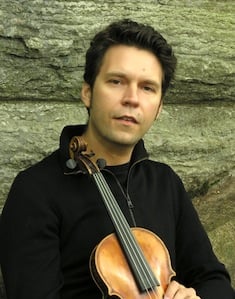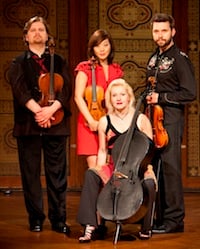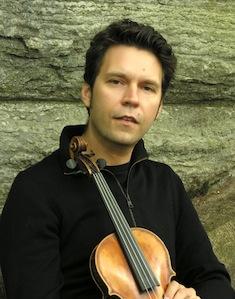
In the 13 years since ETHEL’s founding, the New York–based string quartet — some call it a band of four amplified string players — has become one of the more innovative forces in the new music scene. Not that it hasn’t, like all ensembles, experienced several personnel changes. Five or so years ago, founding violinist and composer Todd Reynolds, a longtime member of Bang on a Can and an early member of Yo-Yo Ma’s Silk Road Project, decided to return to freelancing. And now, ETHEL cofounding violinist Mary Rowell has been forced to leave, for health reasons.
On July 23, Rowell joins ETHEL at Yerba Buena Center for her final performance: the premiere of a work she helped bring to fruition, Convergence Liberation, by composer, jazz saxophonist, and San Francisco State University Professor Hafez Modirzadeh.
ETHEL violinist Cornelius Dufallo speaks to SFCV about the genesis of the work and how it affirms the ensemble’s core mission: to promote the music of our time and bring the string quartet “fully into the 21st century.”
You speak of moving fully into the 21st century. Why does that involve amplification?
We amplify for a number of reasons. One is timbral. It’s not about volume, although we can be loud if we have to be. (We might be playing with a rock drummer, for example.) But the reason we began amplifying ourselves was timbral.
Number one: Young people are often more used to amplified sound than the sound of acoustic string instruments. We felt at the time that it was a way of connecting directly with young people.
The other side is that playing amplified gives us a bigger palette of timbres to choose from. It’s an expansion of our instruments. Instruments have been changing for centuries. For example, how shocking must it have been to go from the harpsichord to the fortepiano?
One of the ways we can expand our timbres is through digital effects; another is through amplification. We use very-high-quality microphones; we don’t use pickups. We can play extremely soft dynamics that can be [captured] by mics and sound designers in ways that might not communicate were we playing acoustic.
The string instrument is an amazing piece of technology. That’s why I say we’re interested in expanding its reach. We are also interested in changing it, but only for the purposes of expanding it, not simplifying it or dumbing things down.
Your forthcoming collaboration with Hafez Modirzadeh sounds mouthwatering.
We’re interested in changing [the string instrument], but only for the purposes of expanding it, not simplifying it or dumbing things down.
It is. Hafez is a jazz musician and Ph.D. ethnomusicologist. He’s also an amazing saxophone player and jazz innovator. He’s worked closely with Ornette Coleman, who is one of his mentors.
He’s a brilliant guy, and has written fascinating articles about his interest in cross-cultural collaboration. He’s especially interested in finding what is universal in the process of making music, and how that is a reflection of human interaction and society itself.
Over the years, he’s developed his own music language, which he started out calling “chromodal discourse.” Now he’s interested in the process of “composting music”: taking the music of different cultures, breaking it down, and turning it into musical compost through which new things can grow.
We approached him first, and then he proposed this particular project. After we perform it at Yerba Buena, we’ll record it at a studio in San José. The ensemble includes us, Hafez, a Spanish singer, an Iraqi trumpet player, and an Iranian musician. The music is a really interesting combination of American jazz, ancient Persian music with microtonal tunings, and Spanish music. It’s composting music!

Photo by James Ewing
It’s also extremely personal, and requires us to be in the same room together to create. It’s also very difficult to put down on paper. Hafez comes to New York, describes what he’s going for, plays examples of Iranian music and gamelan that he’s worked into the piece, and shares his own systems of notation.
A lot of the music is very improvisational, including improvisation on our part. We’re not a jazz string-section that simply holds chords. We bring our own personalities to it. He’s even written specific parts for Mary [Rowell]’s sound, and mine.
How does the music make you feel?
It’s very emotional and deep. It’s also very rhythmically vital, but with moments of free expression and extreme lyricism. Hafez’ music is not necessarily about showcasing virtuosity; it’s about expression and cross-cultural communication. There’s also a kind of exoticism to it because of some of the non-Western instrumentation. Overall, it’s uplifting.
He calls the suite Convergence Liberation. I get the “convergence” part. Does “liberation” signify “uplifting”?
For us, it’s about liberation from preexisting constraints of genre and culture. ETHEL is always interested in breaking down those walls.
It’s also liberating [music] from established norms of genre and concert presentation. It’s an adventure. We’re always looking for new experiences and experiments. And the music is really beautiful. It’s also very old, in so many ways, because of the ideas and sounds that Hafez brings to it. For him, I think it’s also about searching for a liberation of the human spirit.
We want to continue building bridges across genres and cultures, breaking down boundaries and exploring new possibilities for the string quartet.
Are some of the sounds new to you?
Oh yeah, very new. In particular, the Persian or Iranian instruments [with which] we’re going to be collaborating with ETHEL have never been performed with them before. The same with the very ancient microtonal tunings that Hafez uses.
We may change our tuning, or we may stay in equal temperament and juxtapose the two different worlds. Just performing with instruments that are tuned like that creates microtonal beats that are fascinating. And the combination of the Spanish singer, Iraqi trumpet player, Iranian instruments, and Hafez’ connection to jazz is one I’ve never experienced.
What else is on ETHEL’s agenda?
We have a couple of really exciting programs that we’re touring next season. One is “Present Beauty.” Every piece on the program relates to our idea of experiencing the beauty of the present moment. Philip Glass, Julia Wolfe, Huang Ruo, and Terry Riley are among the composers represented.
Another program we’re touring is called “Music of the Sun.” It’s a collaboration with Native American flute player Robert Mirabal. We’ve worked together for quite a while, but we wanted to tour with him this season.
Robert wanted to present a program that relates to Native American sun mythology. That’s important to us, not only because we have a real interest in Native American music, but also because we want to raise awareness of our relationship to the planet. We perform a number of pieces that Robert composed, some we composed as well, and also music by John Luther Adams.
How would you explain the difference between you and Kronos [Quartet]?
It’s a good question that I don’t mind answering. We’re indebted to Kronos. They’ve been around longer, and have been a huge inspiration to us. And naturally, we’re different, because we’re different people.
In a lot of ways, Kronos and ETHEL are similar in our dedication to a particular direction in contemporary music that has gotten away from the “ivory tower.” But our approach is a little different. Anything more I’d end up saying sounds like I’m putting them in a box, which I don’t want to do.
Moving right along, are you the first violinist or second?
We switch off.
As both the leading voice and the “in-between” voice that brings top and bottom together, as it were, you play a really important role in the quartet. What’s your vision of ETHEL’s direction in the next five or 10 years?
I’d like to see us continue to commission and record new works by the most compelling composers of our time, maintaining a strong connection to young composers and youth in general. It’s important to foster the next generation of composers. And we want to continue building bridges across genres and cultures, breaking down boundaries and exploring new possibilities for the string quartet.
These have been really great questions.
What? You don’t get questions like this when you do other interviews?
Oftentimes, we get questions like “Why do you call yourselves ETHEL?”
Well, in case someone’s wondering, why do you call yourselves ETHEL?
We call ourselves ETHEL because it’s just a name. When the group started, they wanted to have a name that didn’t put them in a box. By calling yourselves “the So-and-So String Quartet,” you put yourselves in a box. They wanted to name it like you’d name a rock group.
So you’re not the Ethel String Quartet, you’re just ETHEL?
Yeah. Sometimes people call us “the Ethel String Quartet.” We’re not, but we don’t get upset about it.

